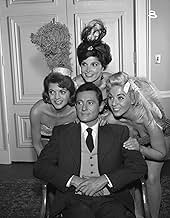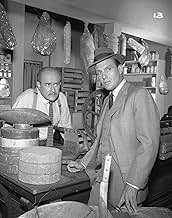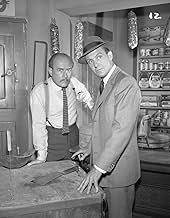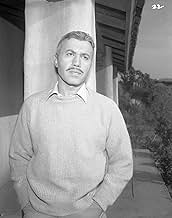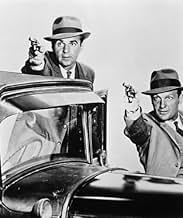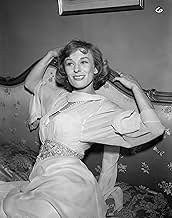NOTE IMDb
8,0/10
3,3 k
MA NOTE
Ajouter une intrigue dans votre langueSpecial Agent Eliot Ness and his elite team of incorruptable agents battle organized crime in 1930s Chicago.Special Agent Eliot Ness and his elite team of incorruptable agents battle organized crime in 1930s Chicago.Special Agent Eliot Ness and his elite team of incorruptable agents battle organized crime in 1930s Chicago.
- Récompensé par 2 Primetime Emmys
- 4 victoires et 7 nominations au total
Parcourir les épisodes
Avis à la une
I bought the first series of DVDs yesterday and until then, I never knew there was a two-hour pilot movie about it. I always thought Robert Stack was a better Eliot Ness than Kevin Costner. Stack's Ness was more like a tough, no-nonsense federal agent while Kevin Costner played him more like a nerdy accountant. This used to be my dad's favorite show and, on nights when I didn't have school the next day, he would let me stay up and watch it with him. When I was in college, I caught it when it was in syndication. I hope they continue to put out these DVDs until they have the whole series out. I'm really looking forward to it.
Life sure was simple back when this series first aired. You rooted for the good guys and hissed at the bad guys and you were glad, in the end, to see Capone and his cohorts get what was coming to them. It also shows that we have to be ever vigilant with our government officials so that this kind of evil cannot permeate our society. Great action-packed series and now lives forever in the DVD format. Now, if only THE FUGITIVE would come out on DVD.
Life sure was simple back when this series first aired. You rooted for the good guys and hissed at the bad guys and you were glad, in the end, to see Capone and his cohorts get what was coming to them. It also shows that we have to be ever vigilant with our government officials so that this kind of evil cannot permeate our society. Great action-packed series and now lives forever in the DVD format. Now, if only THE FUGITIVE would come out on DVD.
This was a one hour crime drama show shot in spartan black and white that lasted four seasons and supposedly followed the exploits of Elliott Ness (Robert Stack) and his Untouchables (unbribable) during their time in Chicago, 1931- 1933, although the details are very fictionalized.
It managed to stay interesting and creative by centering loosely on the criminal exploits of Al Capone and mainly Frank Nitti, played by Bruce Gordon throughout the series, but branching out to other Prohibition era criminals, often without the involvement of the Capone gang, and sometimes even without much mention of the Untouchables themselves. In fact, the Untouchables are often shown dealing with issues such as local murders that would be outside the purview of federal law enforcement and more in line with what the local police would have dealt with.
The guest stars are like a who's who of 1960s TV and even film - Elizabeth Montgomery, Lee Marvin, Cliff Robertson, Victor Buono, Rip Torn, Werner Klemperer, Brian Keith, etc. - as well as some veteran film stars such as William Bendix, Barbara Stanwyck, and J. Carroll Naish.
The show is episodic, skipping around in time, and it is interesting that with all of the talk of bringing criminals to justice that Ness ends up shooting it out with and ultimately killing almost all of the criminals at the end of the show. Either that or rival criminals ended up killing each other. The Department of Justice couldn't have been happy about that.
Ness died shortly before this series began, and it is ironic that the best days of his career were during his time with the Untouchables. Afterwards his life went on a downwards trajectory and included a couple of divorces, a failed election campaign for mayor of Cleveland, and failed business ventures. His time with the Untouchables largely forgotten by his death, this TV show resurrected interest in that period of history and thus that period of Ness' life.
It managed to stay interesting and creative by centering loosely on the criminal exploits of Al Capone and mainly Frank Nitti, played by Bruce Gordon throughout the series, but branching out to other Prohibition era criminals, often without the involvement of the Capone gang, and sometimes even without much mention of the Untouchables themselves. In fact, the Untouchables are often shown dealing with issues such as local murders that would be outside the purview of federal law enforcement and more in line with what the local police would have dealt with.
The guest stars are like a who's who of 1960s TV and even film - Elizabeth Montgomery, Lee Marvin, Cliff Robertson, Victor Buono, Rip Torn, Werner Klemperer, Brian Keith, etc. - as well as some veteran film stars such as William Bendix, Barbara Stanwyck, and J. Carroll Naish.
The show is episodic, skipping around in time, and it is interesting that with all of the talk of bringing criminals to justice that Ness ends up shooting it out with and ultimately killing almost all of the criminals at the end of the show. Either that or rival criminals ended up killing each other. The Department of Justice couldn't have been happy about that.
Ness died shortly before this series began, and it is ironic that the best days of his career were during his time with the Untouchables. Afterwards his life went on a downwards trajectory and included a couple of divorces, a failed election campaign for mayor of Cleveland, and failed business ventures. His time with the Untouchables largely forgotten by his death, this TV show resurrected interest in that period of history and thus that period of Ness' life.
I had never heard of "The Untouchables" TV show until one morning
my 8th grade English teacher, Mr. Schmidt started ranting about the
graphic violence depicted in movies and on television shows such as
"The Untouchables" and what was he world coming to? From the next
broadcast, I was an avid fan. Much as in the style of the James Cagney
classic of 1933, "Public Enemy," "The Untouchables" wove a web of
mysterious gangland horror by NOT showing the graphic violence but by
instead keeping the killing in the shadows. The creators of the series
never forgot that there is nothing you can show in theater that can
measure up to the imagination of the audience. Another mysterious dimension to the series is, like "The Alfred
Hitchcock Show", "The Untouchables" had an uncanny knack of featuring
actors who would later become stars or at least very well known faces
in movies and on television. After 4 years in the air force including
a year in Vietnam, I watched the series as daily re-runs during the
summer of 1971 just before going to university in Tokyo. One episode
had Telly Savalas as an up and coming bookkeeper with The Mob run by
Frank Nitty while Al Capone was in prison. That evening other business
pulled me away from the television set and I figured I'd see the second
half of the show some other time. Because I have been in Japan ever
since, I never did find out whatever happened to the character played
by Telly Savalas. Less than two years later, however, Telly Savalas
finally made it big in television as Kojak.
my 8th grade English teacher, Mr. Schmidt started ranting about the
graphic violence depicted in movies and on television shows such as
"The Untouchables" and what was he world coming to? From the next
broadcast, I was an avid fan. Much as in the style of the James Cagney
classic of 1933, "Public Enemy," "The Untouchables" wove a web of
mysterious gangland horror by NOT showing the graphic violence but by
instead keeping the killing in the shadows. The creators of the series
never forgot that there is nothing you can show in theater that can
measure up to the imagination of the audience. Another mysterious dimension to the series is, like "The Alfred
Hitchcock Show", "The Untouchables" had an uncanny knack of featuring
actors who would later become stars or at least very well known faces
in movies and on television. After 4 years in the air force including
a year in Vietnam, I watched the series as daily re-runs during the
summer of 1971 just before going to university in Tokyo. One episode
had Telly Savalas as an up and coming bookkeeper with The Mob run by
Frank Nitty while Al Capone was in prison. That evening other business
pulled me away from the television set and I figured I'd see the second
half of the show some other time. Because I have been in Japan ever
since, I never did find out whatever happened to the character played
by Telly Savalas. Less than two years later, however, Telly Savalas
finally made it big in television as Kojak.
This show's concept was hastily developed to become a one-hour weekly dramatic series after the success of the beautifully produced made-for-television movie "The Scarface Mob". At first, the producers tried filming the capture of other important criminals using Eliot Ness, the TV-film's fictionalized real-life hero, as their central character. Then they designed a unit like the 1930s "Untouchables" squad depicted in the TV-movie, a federal group combating gang activity and other crimes in Chicago, one headed by Ness (Robert Stack) who worked out of an office in the city. He had six men, with Martin Flaherty (Jerry Paris), Jack Rossman, (Steve London), Enrico Rossi (Nicholas Georgiade), Lamarr Kane (Chuck Hicks) and William Youngfellow (Abel Fernandez) as its mainstays. In the second year, Paris left to be replaced by Lee Hobson (Paul Picerni) for the remainder of the series' run, and Cam Allison (Anthony George) was added for that year only. It was also decided that Frank Nitti (Bruce Gordon) and other mob bosses would be used as the main scheming villains without a regular "Al Capone" being portrayed. Nitti was killed off four times during the series, but Gordon was so popular with the show's watchers he was resurrected each time. A stable of regular police and ganglord types was also developed, played by Oscar Beregi, Joseph Ruskin, Frank Willcox, and Nehemiah Persoff with regular police and useful guest stars being hired a number of times. As Robert Stack had feared from the beginning, the show tended to marginalize the role of the ethical Ness in favor of unglamorously and dramatically portraying the activities of the victims, criminals, or crimelords of the week. The use of a narrator, radio commentator Walter Winchell, helped to keep the ethical view uppermost in observers' minds; and frequently, Ness and his squad were able to get across the desirability of cooperating with police, as this idea finally sank in. Outside agents played by John Gabriel, Jack Lord and others were sometimes used to improve a script. But from the first, the show's outstanding quality was the abilities of writers, directors and guest actors to produce powerful hour-long series. "The Petrone Story", "The Rusty Heller Story", "Cooker in the Sky", "Ginger Jake" and a hundred others may have occasionally overdone graphic detail and use of machine guns, but they were often brilliantly cinematic. The list of directors who toiled for the series included 29 first-raters including Ida Lupino, Tay Garnett, Vincent McEveety, Paul Wendkos, Richard Whorf, Walter Grauman and Bernard L. Kowalsi among others. The writers' list included 40 names, many illustrious, such as Robert C. Dennis, David P. Harmon, Ernest Kinoy, Harry Kronman, John Mantley, Gilbert Ralston, Sy Salkowutz, Alvin Sapinsley, George Slavin, William Templeton. Guest stars such as Patricia Neal, Elizabeth Montgomery, Lee Marvin, Arlene Martel, Will Kuluva, Dolores Dorn-Heft, Robert Middleton, Ruth Roman, Brian Keith, William Bendix, Barbara Stanwyck and Joe de Santis were always an extra cause to tune in to the latest adventure. In the last year, producer Quinn Martin bowed to pressure groups and tried to replace Italian surnamed villains with others; but the top-ranked series was canceled after 4 unforgettable years. To measure the quality of "The Untouchables" against most other series is impossible; its scenes have far more power than those of almost any other series; It was not always ethical fiction; but the series always had first-rate production qualities, acting, writing and directing. It holds a very high place in U.S. film history.
i became aware of the untouchables in the mid-late 1970's. when it was on, i stopped everything to watch it sometimes twice a day. didn't matter that i saw each episode a million times! the stories, the acting, the theme song was the best there is. Robert stack,Paul Picerni, Bruce Gordon, Neville Brand and especially Nick Georgiade (who is my very most favorite) all did great jobs. the show still holds up today. in fact, its better than most of whats on today! it would be great if a channel would pick it up and we could watch it again. just knowing these untouchable websites exist makes me feel really warm and good. thanks for being here for us. I've been trying to locate nick georgiade to write a fan/thank-you letter but have been unsuccessful. well, i can look at him here. i miss this show.
Le saviez-vous
- AnecdotesWalter Winchell received a reported $25,000 per episode for his narration on this series. With his signature machine gun dialogue delivery, he could apparently rack up almost 200 words per minute.
- GaffesThe opening credits for the fourth season show a book open to a page that reads "The Untouchables, 1929--1933". This contradicts the chronology of several episodes set in 1934 or 1935.
- Citations
Police Officer: There is nothing in that area... except an old abandoned warehouse.
- ConnexionsEdited into Le tueur de Chicago (1959)
Meilleurs choix
Connectez-vous pour évaluer et suivre la liste de favoris afin de recevoir des recommandations personnalisées
- How many seasons does The Untouchables have?Alimenté par Alexa
Détails
- Date de sortie
- Pays d’origine
- Langue
- Aussi connu sous le nom de
- The Untouchables
- Lieux de tournage
- Sociétés de production
- Voir plus de crédits d'entreprise sur IMDbPro
- Durée
- 50min
- Couleur
- Mixage
- Rapport de forme
- 4:3
Contribuer à cette page
Suggérer une modification ou ajouter du contenu manquant


